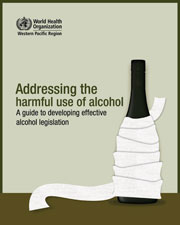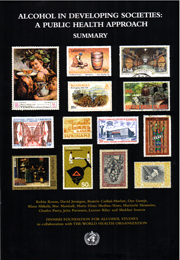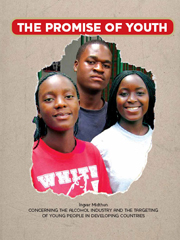
Men of Quality are not afraid of Equality
This was one of the messages that came out of the conference “Reconstructing Manhood?” which took place in Oslo 26-27 October. The conference was the first of its kind in Norway, presenting experiences from engaging men in developing countries to a Norwegian audience.
Other key messages from the conference were:
-
Violence against women is a global issue and one third of the world’s women are affected.
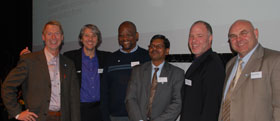
- Intimate partner violence is not a “women’s issue” or a private issue.It is just as much a concern for men - and for governments, NGOs and individuals alike.
- Men are a part of the problem, and can therefore also be a part of the solution.
- One man can make a difference!
- We must challenge men’s silence in the face of gender-based violence committed by other men, and this is a responsibility for men.
- Our challenge is to show to men the concrete and immediate advantages of gender equality, also for men themselves, not only for women.
- We must also change the structural, including understanding the impact of economic stress on women and men.
- There is a silent, large majority of men who care. The challenge is to make them speak up.
Organizers of the conference were:
FORUT – Campaign for Development and Solidarity
Reform – Resource Centre for Men
The Ministry for Justice and the Police, which also funded the event.
The Ministry of Children, Equality and Social Inclusion
The first day of the conference was organized as a plenary session with more than 150 participants. On the second day the participants split into four parallel seminars with one of the international speakers as expert speaker and resource person in each seminar. These seminars gave the opportunity to interact more directly with the international speakers and to discuss their working methods more in detail.
Broad mix
In his opening speech on the 26th of October FORUT’s Secretary General, Morten Lønstad, pointed to the fact that the conference topic had attracted a broad and interesting mix of participants; NGO leaders, government representatives, researchers, students and concerned individuals. “This conference provides an opportunity for practitioners to meet scholars, for feminine activists to meet male activists and for North to meet South. Some of us have experiences as political activists, some are helping women who suffer from men’s violence, some cover gender issues for the media and some are assisting men who are in a process of change. Some are engaged in gender issues in Norway, others are involved in gender programmes in developing countries”, said Mr. Lønstad from FORUT.
New action plan in Norway
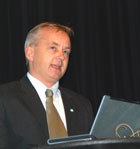
Four world leading organizations and male activists were invited to share their experiences from engaging men at the conference:
- Desmond Lesejane from Sonke Gender Justice in South Africa
- Satish Kumar Singh from Centre for Health and Social Justice, India
- Gary Barker, who worked with Promundo in Brazil for many years. Co-funder of the global network MenEngage, now with the International Centre for Research on Women (ICRW) in Washington DC
- Jackson Katz, leading American male activists who has been working in particular with masculinity issues towards football players and soldiers.
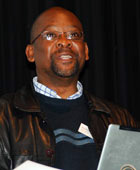
One Man Can
However, individual action is not enough, said Desmond Lesejane. Preventing gender-based violence and changing the notion of a real man also takes national leadership. Consequently, Sonke works on all levels of the South African society; at the national level, with NGOs, in local communities and with individual men. Participatory methods are being widely used in communication with men. Men are invited to reflect on their own experiences together with their friends and colleagues. All the time this if followed by initiatives to involve men in practical action. At all times the objective is to show men the benefits of gender equality. “One Man Can Make a Difference. Men are a part of the problem, and can therefore also be a part of the solution”, said Mr. Lesejane.
The bystander approach
Jackson Katz from the US challenged men’s silence in the face of gender-based violence committed by other men. He presented the "bystander approach” which is used in the Mentors in Violence Prevention program (MVP). This method focuses on young men not as perpetrators or potential perpetrators, but as empowered bystanders who can confront abusive peers – and support abused ones. A "bystander" is defined as a family member, friend, classmate, team-mate or a co-worker.
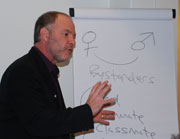
He also raised the issue of the de-gendered language which is so common in most cultures: “We most often say that she was beaten or she was raped in stead of ‘a man beat her’ or ‘a man raped her’. By using the passive voice we cover up the fact that more than nine out of ten such acts of violence are being committed by men. The privilege of men’s power is therefore that we remain invisible and unquestioned”. One strategy in challenging prevailing notions of masculinity and in involving men for a change is to make invisible things visible.
Not a licence to beat
Satish Kumar Singh represented an India perspective in the masculinity conference in Oslo. He is the Deputy Director of the Centre for Health and Social Justice, an NGO based in Delhi. CHSJ is working with masculinity programs in 18 states in India. Mr. Singh started his presentation by referring to the common belief that intimate partner violence is “family matter” and that many seem to believe that “marriage is a licence to beat wife”. However, he said, most men are not violent, but silent.
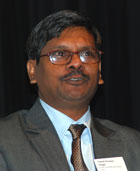
“Our method is to open platforms and forums for reflections among men. We make men realize their own violent behaviour and we introduce ways to manage anger and frustration other than using violence”, said Satish Kumar Singh. Our challenge is to show to men the concrete and immediate advantages of gender equality, also for men themselves, not only for women. Changed relationships between spouses are one of the concrete aims of the MASVAW program; a “sister and brother” relationship must replace male dominance and power over women. Mr. Singh concluded that “Men of Quality are not Afraid of Equality”.
Millennium Development Goals
Gary Barker is one of the founders of the global network MenEngage. This is a forum for exchange of information and experiences among organizations trying to mobilize men for gender equality and, more specifically, to prevent gender-based violence and the spread of HIV/AIDS. He has been instrumental in producing an evaluation report of more than 50 national masculinity programs worldwide. “The conclusion is that such programs work – if they have a gender-transformative objective and are well implemented”, said Mr Barker. He presented results from the so-called IMAGES study; International Men and Gender Equality Survey. The IMAGES study gives data on male and female attitudes and behaviour in Brazil, Mexico, Chile, Croatia, India and Rwanda.
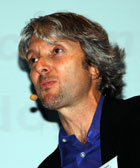
Mr. Barker concluded his presentation with the following: If we want to change men and engage them as allies in achieving the Millennium Development Goals…
- We must change the structural, including understanding the impact of economic stress on women and men;
- We must find men’s self-interest in change, while also creating real sanctions for men who use violence and abuse power;
- We must acknowledge the dual inequalities of income and gender;
- We must move beyond a zero-sum game approach that views women’s gains as men’s losses while not losing sight of the inequality we’re starting from.
The concluding remarks of the conference were given by Norway’s Minister of Children, Gender and Social Inclusion, Audun Lysbakken. His starting point was that many men do care about gender-based violence and gender inequality. “There is a silent, large majority of men who care. The challenge is to make them speak up by giving them training in how to speak up. We must realize that we have not managed to engage men on a broader scale”.
The White Ribbon Campaign
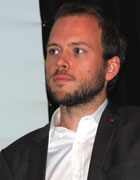
He pointed to the launch of the White Ribbon campaign in Norway as one such initiative to make men stand up and speak up. As part of this the Campaign and the government are now presenting an awareness campaign together with the Norwegian Football Associations and prominent football players. Mr. Lysbakken said: “We aim at reaching men through football. In this campaign national football heroes will be invited to step forward and show that they do not tolerate any kind of violence against women”.
![]()
![]()
Developed with CustomPublish CMS by Nettinfo AS

